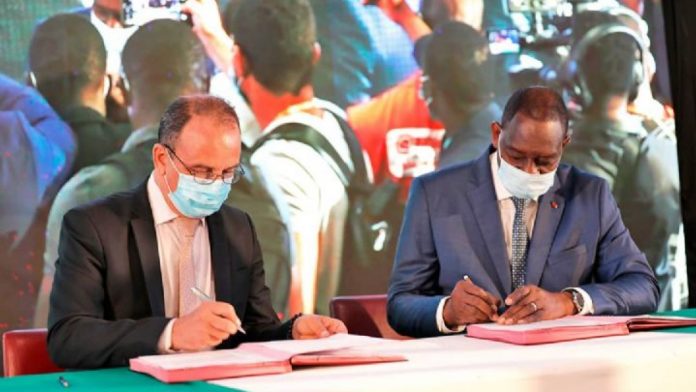Committed to a rice growing development strategy, Côte d’Ivoire receives support from the OCP group. The country has fallen behind in recent years, but is preparing to return to self-sufficiency in rice.
Côte d’Ivoire and OCP Africa signed a memorandum of understanding on rice. It allows the subsidiary of the Moroccan leader in phosphates to participate in the Ivorian Rice Development Strategy (SNDR) 2020-2030 adopted in March 2020.
The program aims to be self-sufficient in rice by 2025 and to make the country “one of the largest African rice exporters by 2030”, according to the Ivorian government statement. The signatories of the memorandum are the Minister of Rice Promotion, Gaoussou Touré, and the West Africa Vice-President of OCP Africa, Mohamed Benzekri.
For Minister Gaoussou Touré, it is a question of gradually shifting the sector from a traditional non-profitable subsistence rice cultivation to market rice cultivation, modern, efficient, competitive, profitable, sustainable and respectful of the environment.
The National Strategy will also make the rice farmer a full-fledged economic operator, a professional, manager of a profitable and sustainable business that will create jobs and wealth.
This partnership covers four main areas of cooperation, says Mohamed Benzekri. First, the development and innovation of fertilizer formulas adapted to the needs of Ivorian soils for sustainable fertilization.
Second, the development and structuring of the value chain of rice growing activities. Third, the deployment of training and sensitization of rice farmers to good agricultural practices. And finally the development of digitalization to raise awareness and monitor rice growers. OCP Africa’s approach is to facilitate access to quality inputs, financing, training in good practices and markets.
Sharp drop in yields!
For his part, Minister Gaoussou Touré, who welcomed this public-private partnership, indicated that “the development of rice cultivation is a priority for the government”.
Indeed, the stakes are high for a Côte d’Ivoire, which has no reason not to regain food self-sufficiency in rice in the medium term.
After doubling between 2007 and 2015, the production of milled rice, the most consumed in the world, has stagnated at around 1.3 million tonnes per year. The approximately 800,000 Ivorian rice farmers face many challenges.
The first of which is the lack of funding. Which discourages investment in seeds, fertilizers or pesticides. The result: sharply declining yields, for an essentially food and family crop. The plots are small, the crops very dependent on rainfall and the production losses are enormous.
“We were self-sufficient in 1976, we can become that again. But, for the moment, it is complicated,” admits Yacouba Dembele, director general of the Agency for the development of the rice sector (Aderiz). Since January 2018, this agency has been responsible for boosting the sector.
According to FAO calculations, the country covers only a small half of its needs. The major constraints to the development of rice cultivation in Côte d’Ivoire are mainly the low level of use of mineral fertilizers and organic fertilizers and the significant post-harvest losses.
The FAO also points to often unsuitable equipment and often ineffective training of producers. The sector remains, on the whole, still very artisanal, while the marketing of milled rice, through an unorganized circuit, is still informal.
Yet the Ivory Coast is not lacking in assets. Its climate is generally favorable to agriculture, particularly in terms of rainfall (800 mm in the driest areas, it reaches 1900 mm in the Guinean area). Its rural populations have a long tradition of cultivating rice, especially in the west of the country.
Local rice is also subject to competition from imported rice, while “prices on the international market have experienced a downward trend since 2013”, recalls the consulting firm Bearing Point. The country imports a lot and also re-exports a small part to its neighbors, attracting the wrath of the latter “who also aim for self-sufficiency”, recognizes Yacouba Dembele.
Industrialize the sector
The Ivory Coast imports 450 million euros worth of rice each year, and thus ranks fifth in the world among importing countries of this commodity and second on the continental scale. The first is occupied by Nigeria which has imposed, in recent months, a tax of 110% on foreign rice, before closing certain borders.
To regain its sovereignty over the production of this strategic commodity, the Ivorian government is now banking on the industrialization of the sector and, as we can see today, the commitment of the private sector. Moreover, it is with capital from India that the country has strengthened its existing industrial park, by starting up thirty factories and a hundred mini production centers.
The concessions of these units are awarded to private operators, processors who work with small upstream producers, and downstream distributors. The model is based on contractualization: each actor commits to the other, without the direct presence of the state.


































